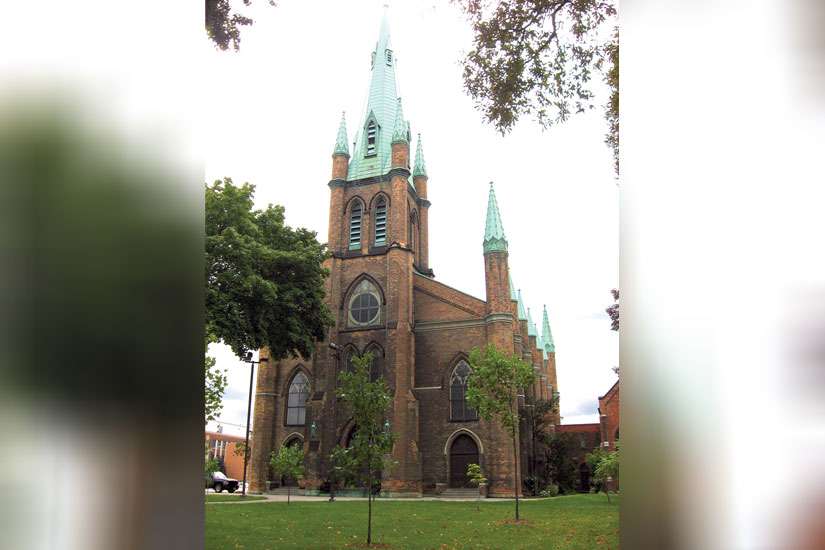The donation to the Diocese of London to repair and restore Our Lady of Assumption Church, an iconic landmark and the highest profile and most historic Catholic church in southwestern Ontario, “has not materialized,” London Bishop Ronald Fabbro wrote in an April 18 letter to Assumption parishioners.
At $10 million, the offer was the “largest single proposed donation” in the diocese’s history, Fabbro said in the letter. But, after due diligence was undertaken, the offer fell through he said.
The bishop said the sticking point was the fact the unnamed donor “did not agree entirely with our due diligence process” and therefore “we could not proceed further.”
“Charities have an obligation to undertake a due diligence process in these types of situations,” the bishop wrote. “It is especially important where the donation is to be used for a particular purpose.” He said the practice was “consistent with that of other charities.”
Fabbro referenced earlier fundraising attempts that have also failed.
“Every attempt to raise funds to repair and restore Assumption Church has begun with promise, only to fail,” he said. “This has been personally painful for me, and for all those involved.”
Kim Spirou, a Windsor professional fundraiser who was hired by the diocese after the first fundraising effort collapsed, said she was shocked that the donation has fallen through.
“It’s not just this donor,” said Spirou, whose contract with the diocese wrapped up a year ago, though she has continued to bring forward potential donors on a voluntary basis since then. “We’ve brought several donors and the diocese has just been refusing to accept anything. So it makes me wonder.”
Spirou added, “Based on everything that’s transpired over the past couple of years I don’t think the diocese ever intended to restore this church.”
Mark Adkinson, diocesan spokesman, called the view that the diocese has no intention of saving Assumption “insulting.”
“Parishes across the Diocese of London spend, on average, $10 million every year on restoration, renovation and other construction projects,” he said. “Significant restorations have been completed or are in progress on numerous churches of various ages and sizes all across the diocese.”
Efforts to restore the elegant Assumption, located adjacent to the University of Windsor campus and overlooking the Detroit River, have run into continual roadblocks. A high-profile professional fundraising effort collapsed in 2012 when the diocese fired the private fundraising firm after an audit showed only a small portion of donations had gone to the church.
A later offer by a local businessman of $3 million — and which fundraisers said would have brought matching funds to $7 million — to kickstart the restoration was also turned down. The rejection came after the donor was charged with weapons offences.
About this latest nixed effort, Fabbro was not available for comment. Adkinson said he could not comment further on why the offer was rejected because “we are respecting the potential donor’s privacy.”
Assumption was closed last fall because the diocese felt the church could not be used due to its state of disrepair. The parish instead moved weekend Masses to the former Holy Name of Mary Church, now labelled Assumption’s McEwan campus.
However, Assumption Church, which is 170 years old, is still being used. The rectory remains open, the church hall still sees activity and daily worship takes place at the small Rosary Chapel.
While rejecting the donation, the diocese has made a commitment to maintain the building indefinitely.
“The church building will be preserved in its present condition to the extent possible,” Fabbro said.
Fr. Don McLeod, a former Windsor-based priest who is temporarily overseeing Assumption until two new priests arrive by this summer (he’s otherwise appointed to St. Joseph’s College in Edmonton), took part in the review of the donor’s offer.
“There were some expectations that were questioned, I guess that’s probably the best way to put it,” he said. “I can’t really go into any great detail because most of it is highly confidential.”
Kate Bahen, managing director of Charity Intelligence Canada, which gathers information on hundreds of charities so that donors make informed choices about where their money will have the greatest impact, said it’s not entirely unusual for recipients to reject donations. She pointed to a Regina aboriginal school that rejected lottery money because the school saw “the destructive effect of gambling” in the community.
But she was surprised by the diocese’s continual rejections of sizable donations for Assumption’s renewal.
“That’s fascinating. We always work with donors and say you have to be careful about picking your charities carefully. Now we’re seeing the flip side, that charities are actually picking their donors carefully.”
(Stang is a freelance writer in Windsor, Ont.)


